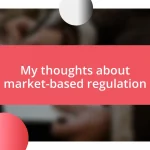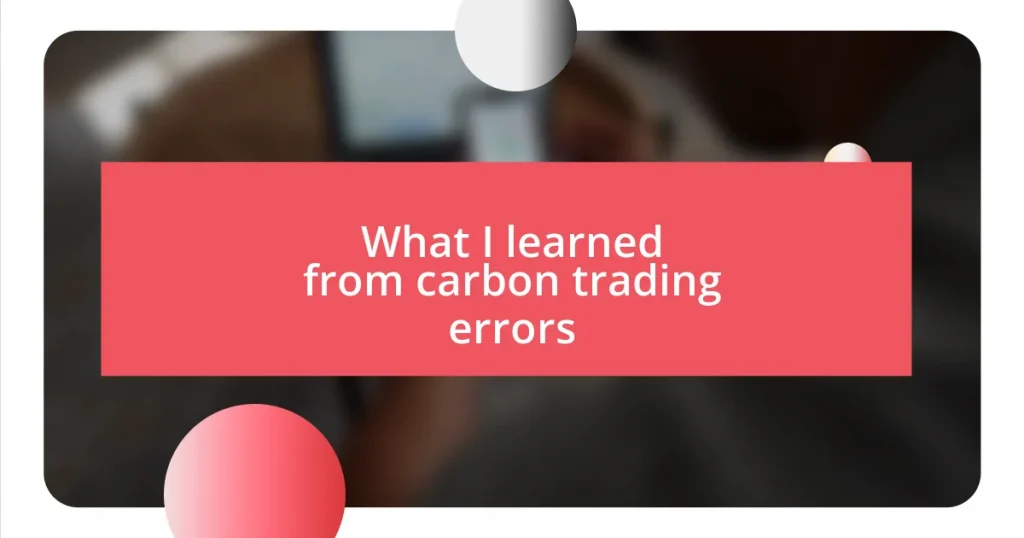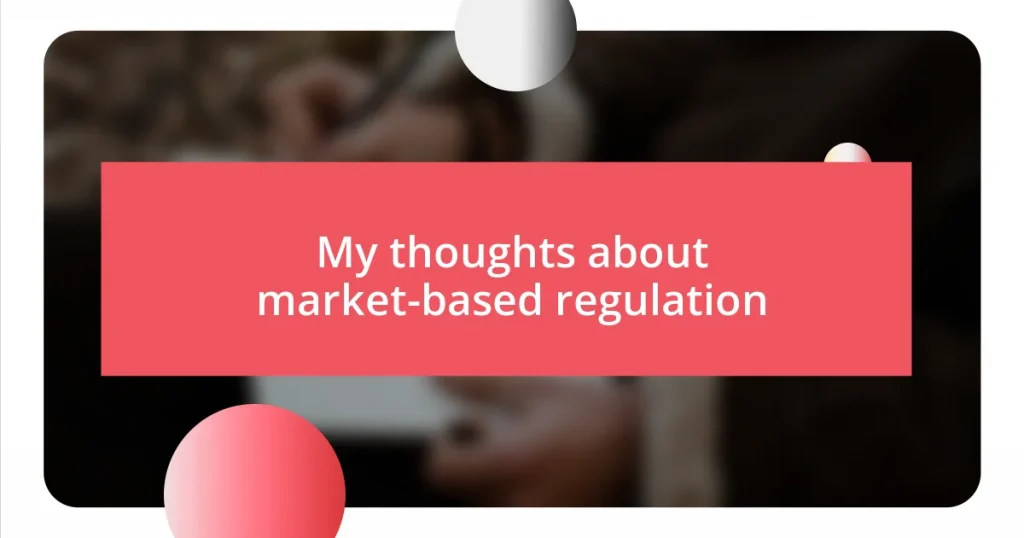Key takeaways:
- Accurate emissions data is essential for regulatory compliance, market integrity, and credibility in carbon trading.
- Common mistakes, such as misunderstanding trading instruments and poor communication, can lead to costly errors and regulatory penalties.
- Future carbon trading practices will benefit from technological advancements, data-driven decision-making, and a culture of continuous learning and communication.
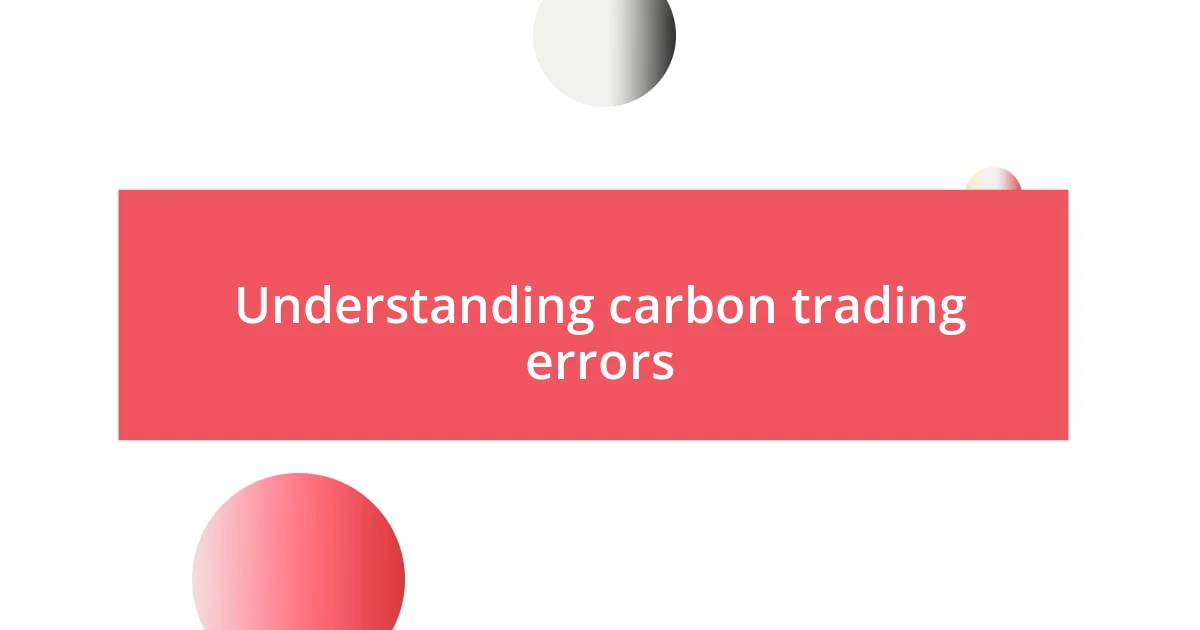
Understanding carbon trading errors
When delving into carbon trading errors, I can’t help but feel a mix of frustration and intrigue. The complexities can be daunting; for example, I once miscalculated emissions reductions in a project I was managing. It was a painful wake-up call, illustrating how easily mistakes in data input can lead to significant financial and environmental consequences.
It’s fascinating to consider how even small discrepancies in reporting can snowball into larger systemic issues. Have you ever felt the weight of responsibility in managing trade data? I remember a time when a colleague overlooked a minor adjustment that spiraled into audit complications. It made me realize just how interconnected our actions are within carbon markets.
The emotional stakes in carbon trading are palpable, with real lives and ecosystems impacted by our errors. I often think about those moments of oversight—an incorrect entry or misunderstanding of regulations—and wonder how many opportunities for genuine progress we might be squandering. Ultimately, each error serves as a reminder of the diligence required in this field.
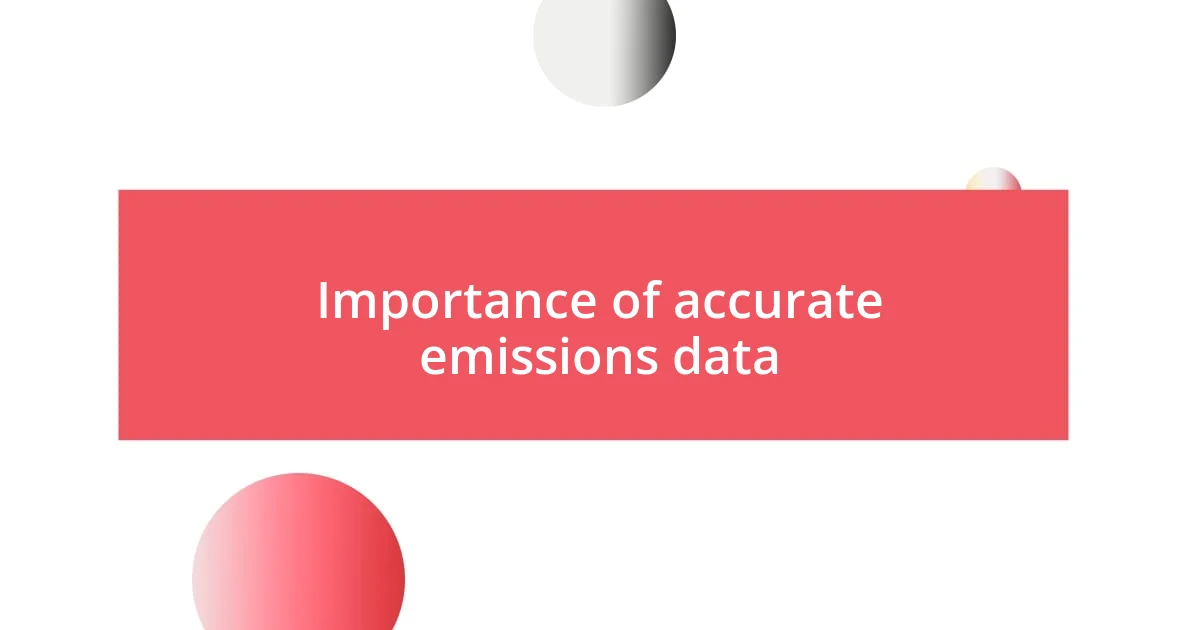
Importance of accurate emissions data
Accurate emissions data forms the backbone of effective carbon trading. Without it, we’re essentially navigating blindfolded in a landscape filled with pitfalls. I’ve seen firsthand how a simple data error can lead to misleading conclusions about a project’s actual impact on emissions. When I managed a project, we once relied on faulty data inputs and, as a result, underestimated our carbon footprint by a staggering amount. The realization hit me hard; we were not only misrepresenting our efforts but inadvertently causing harm to our credibility within the trading market.
Here are a few reasons why accurate emissions data is crucial:
- Regulatory Compliance: Precise data ensures adherence to government regulations and helps avoid penalties.
- Market Integrity: Accurate reporting builds trust among participants in carbon markets, fostering healthy competition.
- Investment Confidence: Investors rely on credible data to make informed decisions about funding and involvement in carbon projects.
- Target Setting: Businesses need reliable data to set realistic and achievable sustainability goals.
Reflecting on my experiences, it becomes clear that the ripple effects of inaccurate data can extend far beyond individual projects. Each number carries weight, and I often find myself reminding colleagues that diligence in data collection isn’t just a job; it’s a commitment to climate responsibility.
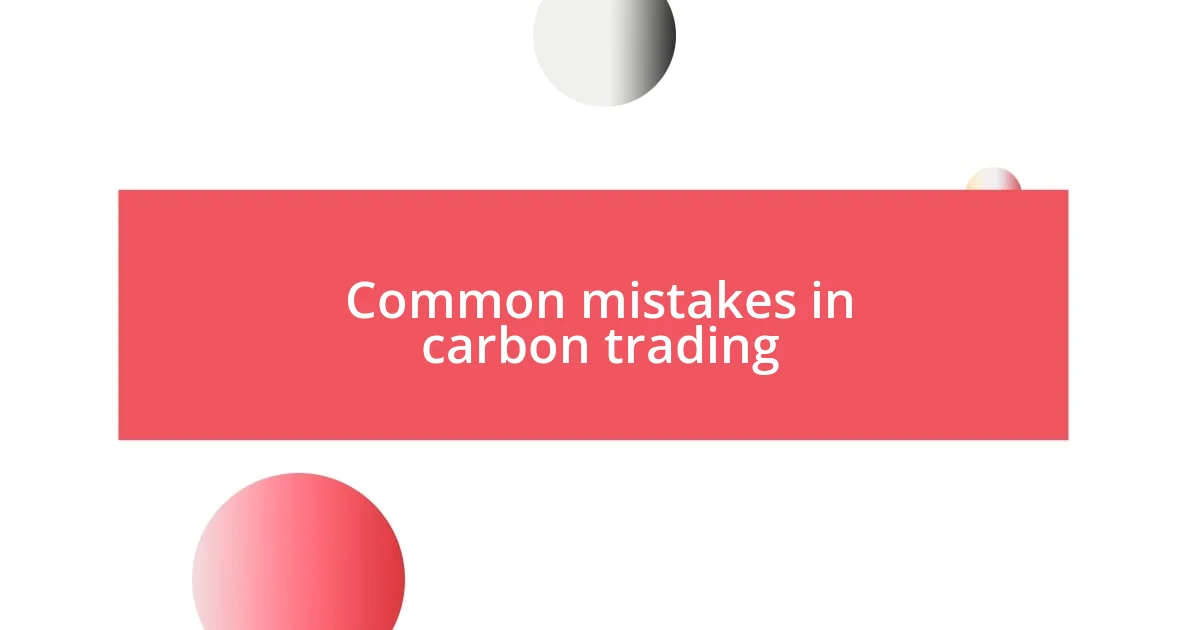
Common mistakes in carbon trading
Common mistakes in carbon trading can often seem trivial at first glance, yet they can have far-reaching repercussions. One of the most frequent blunders I’ve encountered is the failure to fully understand the trading instruments being utilized. There was a time when I assumed that all carbon credits were interchangeable, but I quickly learned that different standards and certifications can dramatically affect their value. This misconception cost my team valuable time as we navigated the complexities of various frameworks, making me realize how vital it is to stay informed about the specifics of our trading environment.
Another significant mistake I’ve seen revolves around communication breakdowns between departments. In one project, our finance and sustainability teams were not aligned on key metrics, leading to a disjointed understanding of our carbon credits. The confusion that ensued was both disheartening and frustrating, as I watched our potential emissions reductions being overshadowed by misalignment. This experience taught me the importance of having clear, consistent communication within all parts of an organization that impacts carbon trading.
Finally, I think it’s crucial to address the pitfall of overlooking regulatory changes. A close colleague once failed to keep up with new compliance guidelines, which ultimately resulted in hefty fines for our organization. It was a hard lesson in vigilance, and I often remind myself and my team that staying updated on policy shifts is not just a formality; it’s essential to our credibility and success in the carbon trading arena. Continuous learning and adaptability are crucial to avoid falling into this trap.
| Mistake | Description |
|---|---|
| Misunderstanding Trading Instruments | Assuming all carbon credits are interchangeable can lead to significant financial missteps. |
| Poor Communication | Lack of alignment between teams can create confusion about metrics and reduce effectiveness in trading. |
| Overlooking Regulatory Changes | Failing to stay updated on compliance can result in costly penalties. |
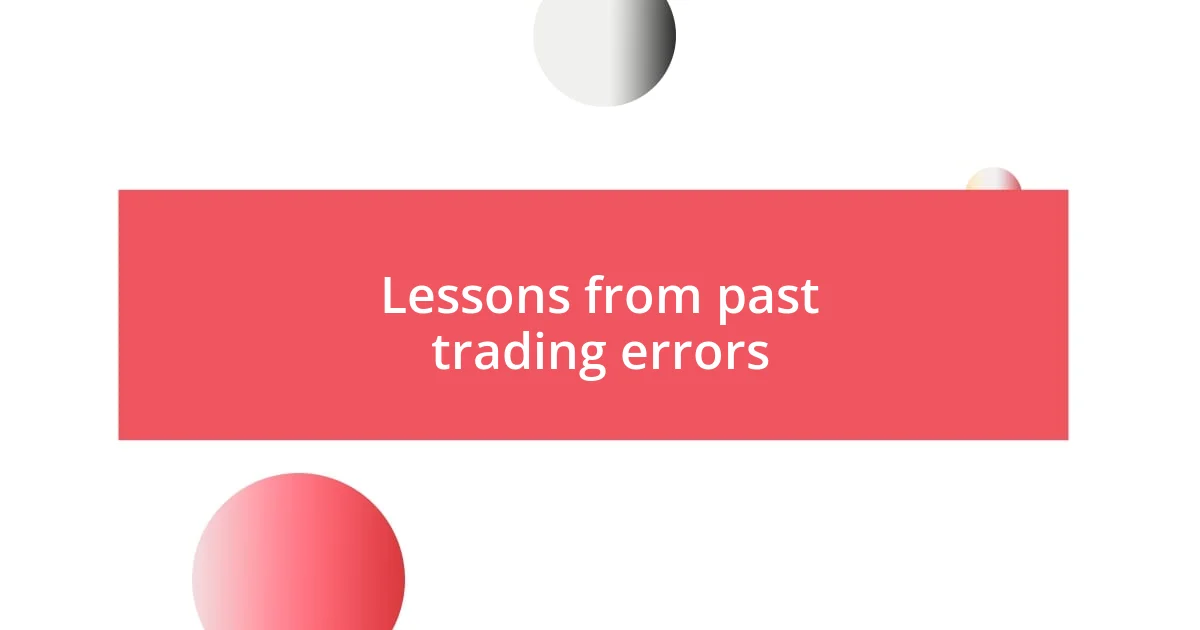
Lessons from past trading errors
When reflecting on the past trading errors I’ve encountered, one lesson that resonates deeply is the importance of double-checking assumptions. There was an instance where my team was overly confident in our understanding of a carbon credit certification. We relied on outdated information, assuming it was still viable. The fallout was swift. It made me realize how quickly confidence can lead to complacency. Have you ever had that moment when overconfidence blinds you to critical details? It’s a humbling experience that reminded me that diligence is the best companion to success.
Another key takeaway was the necessity for constant communication—not just within our teams, but extending to our partners as well. I vividly recall a situation where crucial data points weren’t shared on time due to an oversight in communication with a partner organization. The result? We miscalculated our projected reductions and ultimately left potential credits untapped. That situation was a bitter pill to swallow, and it raised a question in my mind: how often do we assume everyone is on the same page? My experience underscores the value of proactive and clear dialogue in preventing such costly errors.
Lastly, I’ve learned not to underestimate the impact of emotional intelligence in carbon trading. There was a time when our team’s stress levels peaked, causing hasty decisions that led to unfortunate trades. This taught me that stress management and team morale are crucial for sound decision-making. How do we ensure our teams remain grounded during challenging times? By prioritizing mental well-being, we not only foster resilience but also improve our trading outcomes, making them more sustainable in the long run.

Strategies to avoid trading mistakes
Effective strategies are essential for avoiding trading mistakes in carbon markets. One approach that has served me well is routinely conducting comprehensive reviews of all trade documentation. I’ve had moments where overlooking a single detail led to costly errors, reminding me of the old adage: “the devil is in the details.” By scheduling regular audits, I find that we not only catch potential issues early but also foster a culture of accountability and diligence within our team.
Another key strategy revolves around creating a feedback loop that encourages open dialogue. I remember when we set up monthly brainstorming sessions focused on past trades, and it was eye-opening. These discussions helped illuminate areas for improvement, and the insights gained often prevented the reoccurrence of similar mistakes. How often do we take the time to re-evaluate our decisions? It’s a practice that has significantly fortified our trading practices.
Lastly, I’ve realized that utilizing technology can be a game-changer in minimizing errors. We implemented a data analytics tool to track market trends and compliance updates. This not only streamlined our workflow but also provided us with real-time insights, reducing the reliance on human memory alone. Have you ever experience the relief of knowing that technology is backing your decisions? For me, this integration has not only boosted our efficiency but also increased my confidence in the trades we execute.
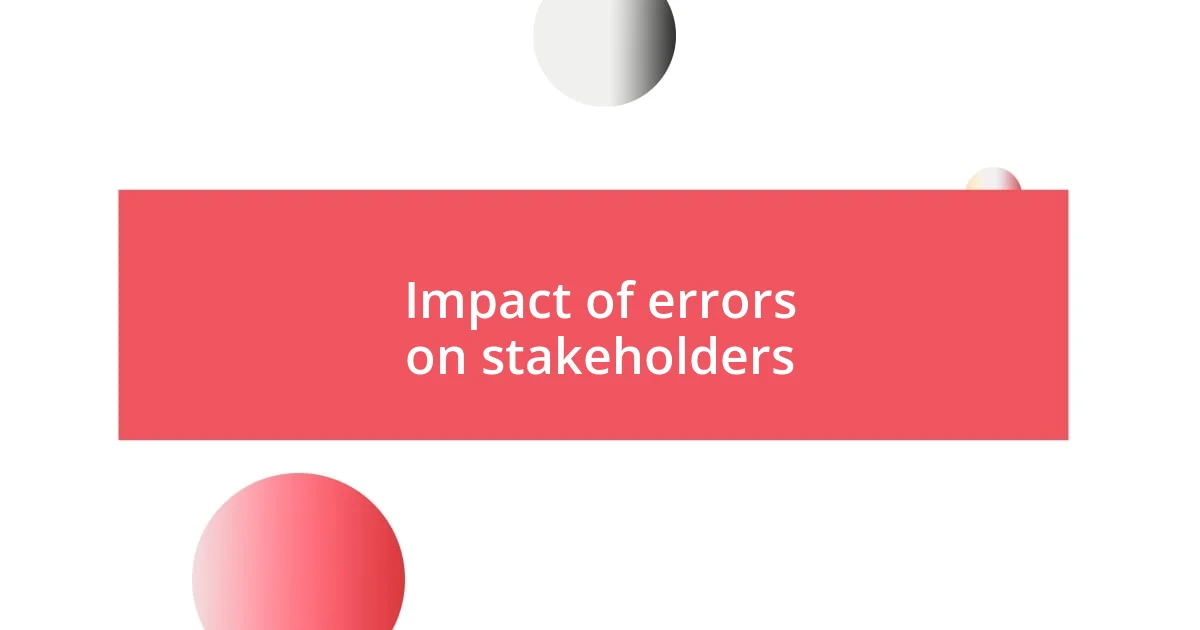
Impact of errors on stakeholders
Errors in carbon trading can have significant repercussions for various stakeholders involved, transcending mere financial impacts. I recall a particular incident where our miscalculation led to a significant loss of trading credits. The ripple effect was felt by not only our team but also our investors who counted on us for sustainable returns. It’s frustrating to see trust diminish based on a mistake that could have been avoided with more vigilant checks. Have you ever felt that stress in a project where the stakes were high?
Moreover, community stakeholders are often left grappling with the consequences of mismanagement. I remember discussing with a local NGO that had invested in carbon offset projects tied to our trading efforts. Their enthusiasm turned to disappointment when project deliverables were compromised due to trading errors. This experience opened my eyes to how our decisions are interconnected with community integrity and well-being. How often do we pause to consider the downstream effects on those outside our immediate circle?
Finally, regulatory bodies also play a crucial role in maintaining market integrity, and errors can lead to strained relationships. There was a time when an oversight in our reporting made us miss a compliance deadline. The ensuing scrutiny from regulators felt like a storm brewing overhead, emphasizing the importance of harmonious interactions. It’s imperative to remember that our transparency and accuracy uphold not just our reputation but the entire system’s credibility. How do we ensure we don’t just meet regulatory demands but also foster trust?
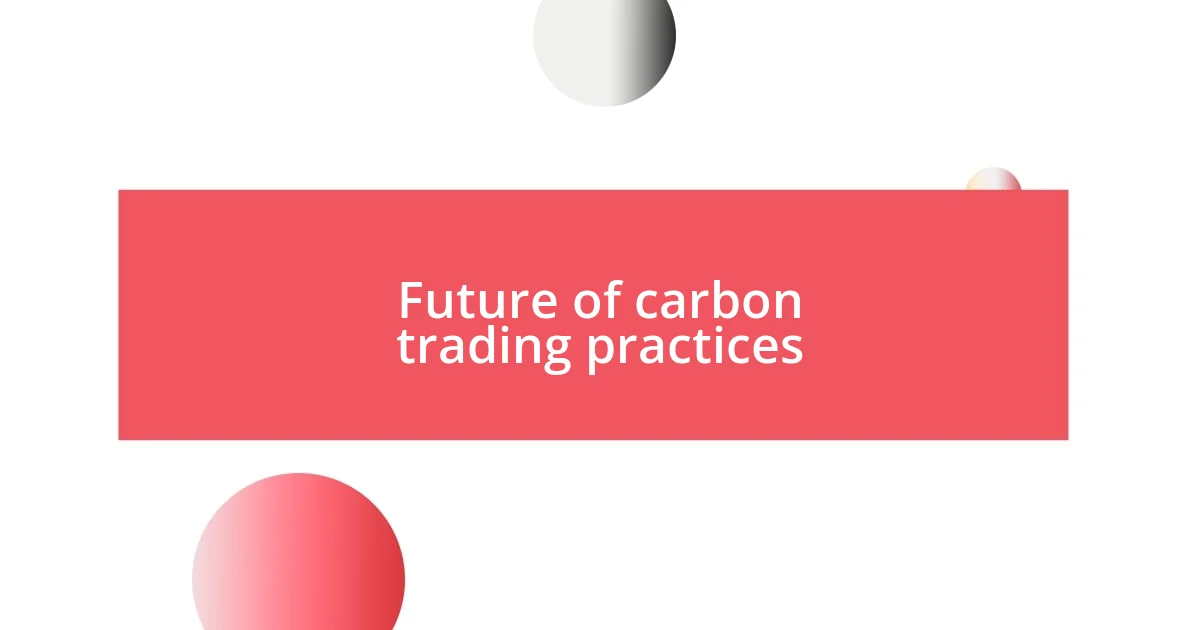
Future of carbon trading practices
As we look ahead, the future of carbon trading practices seems poised for transformation, driven by the desire for greater efficiency and sustainability. I remember a recent discussion with a colleague who highlighted the potential of blockchain technology in enhancing transparency. This innovative approach could significantly reduce the ambiguity that often leads to trading mistakes, fostering a level of trust that is desperately needed in this field. Isn’t it fascinating to think about how such advancements could reshape our interactions and decisions in carbon trading?
Equally important is the growing emphasis on data-driven decision-making. I’ve seen firsthand how predictive analytics can revolutionize our approach by allowing us to anticipate market shifts and adjust our strategies accordingly. During a particularly volatile period last year, we relied heavily on historical data and market patterns to inform our moves. This level of insight is not just refreshing; it reinforces the idea that adaptability will be crucial for future trading success. Are we ready to embrace this shift in how we approach our trading practices?
Finally, I believe that education and continuous learning will play a pivotal role moving forward. There was a time when I attended a workshop focused on understanding regulatory frameworks in depth, and it opened my eyes to the nuances I had previously overlooked. Imagine how cultivating a culture of ongoing education within our teams could drastically reduce errors. It’s clear that we must not only keep pace with regulations but also ensure that our understanding evolves as the landscape changes. How often do we actively seek out new knowledge to avoid the pitfalls of the past? Embracing this mindset could truly redefine the future of carbon trading for all of us.


